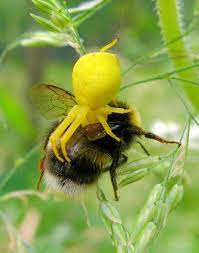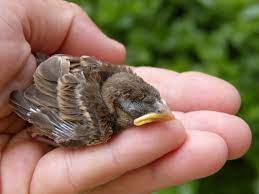
We show our concern for declining numbers of wildlife, birds, and invertebrates by replacing monocultures, such as lawns, with a diverse selection of native flowers, trees, and shrubs. We also spread the word about how our actions affect other creatures sharing planet Earth. We want everyone to understand that habitat fragmentation and destruction, the overuse of pesticides, pollution, and climate change need to be addressed and reduced NOW!
Most folks agree with the idea of planting pollinator gardens and providing bushes and shrubs for caterpillars to munch on. Everybody loves butterflies, bees, and baby birds and wants to help our winged friends.
Unfortunately, that caring can lead to interfering when people step in to rescue an innocent bumble bee in the clutches of a crab spider. STOP! Step back and let it happen.
There is a simple reason for having a predator and its prey. It’s all part of nature’s plan. First of all, birds, bats, wasps, spiders, dragonflies, ladybugs, and other bug-eating insects need protein. They can’t survive on nectar alone. Then as an added bonus, Mother Nature set up her own pest control service where beneficial creatures get rid of the unwanted bugs. Unfortunately, a few good guys become dinner as well, but that can’t be helped.
When you first considered planting a pollinator garden, the thought of providing food and shelter for the pollinators may not have included sacrificing some of the little insects. Of course, it’s not so disturbing when it’s mosquitoes, gnats, spiders, or even ants are the victims. Yet, it takes them all — beneficials and pests, predator and prey to maintain Mother Nature’s balance.

I have seen Facebook posts declaring war on the birds, bats, and wasps that mess around with the caterpillars people enjoy watching. Hopes of seeing the leaf chompers turn into a pupa and then witnessing a beautiful butterfly emerge from the chrysalis were dashed by the enemy. But, hey folks, that’s a part of the balance. So please, don’t feel compelled to protect the caterpillars. They don’t need it!
Another instance of helping/interfering comes when a person finds what looks like an abandoned young bird. Being concerned, you bundle up the little thing, take it home, place it in a box, and try to nurture it. Again, your heart is in the right place, but don’t, just don’t.
Instead, look around and observe:
- Is the bird a nestling or fledgling? Nestlings are small and typically naked with pink skin and maybe a few fluffs. Fledglings are covered almost entirely in down and feathers and will hop around.
- If it’s a nestling - look for the baby’s nest in the nearby bushes or trees and simply put the chick back, and the parents will resume care. Don’t worry about touching the little one. A bird’s sense of smell is not well-developed, and the parents will not abandon their baby. If a nest is not in sight, make a temporary one out of a small container lined with a dry cloth or straw. Place it as high as possible in a nearby tree. Whether it’s a natural nest or homemade, observe it for an hour to see if a parent returns. If they don’t, contact a wildlife rehabilitation center.
- If it’s a fledgling – leave it alone. It’s normal for a beginner to wander around under the watchful eye of their parents as a part of learning to fly. “Rescuing” the little guy and raising it yourself may result in the young bird mistaking humans for family and not developing correctly. In other words, it won’t know how to be a bird.
- If the nestling or fledgling appears injured, sick, or in danger - call a rehab facility, state wildlife agency, or veterinarian immediately. Indicators include: a fledgling unable to stand or hop normally, wet feathers even though it’s not raining, or lots of flies signaling an open wound. Also, if there’s a curious cat nearby…
- Do not feed – leave that for the professionals.
 RSS Feed
RSS Feed

